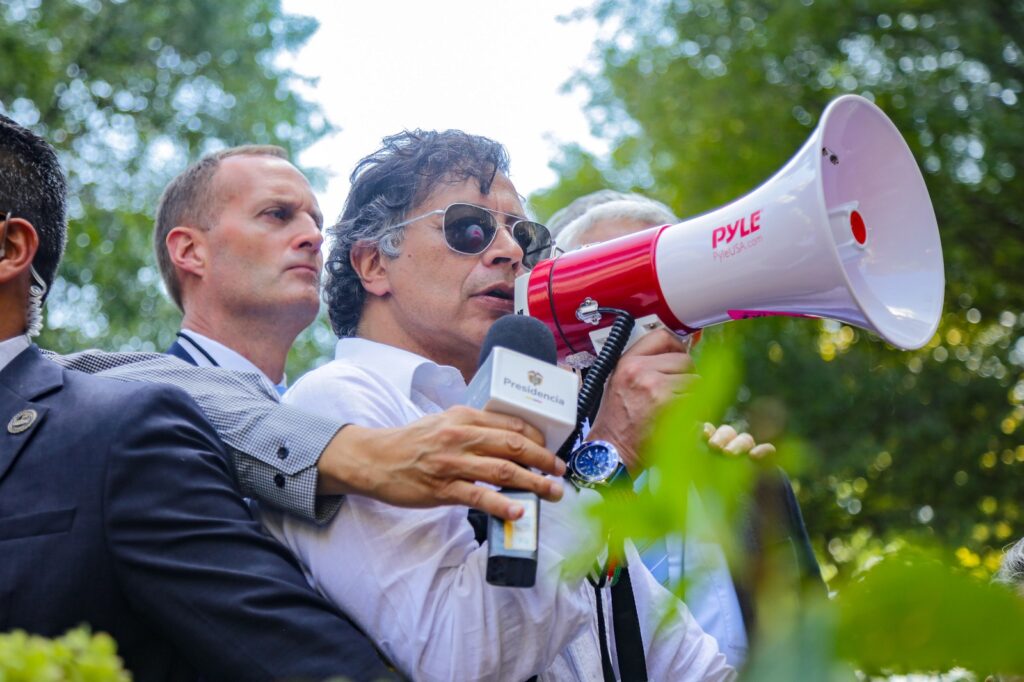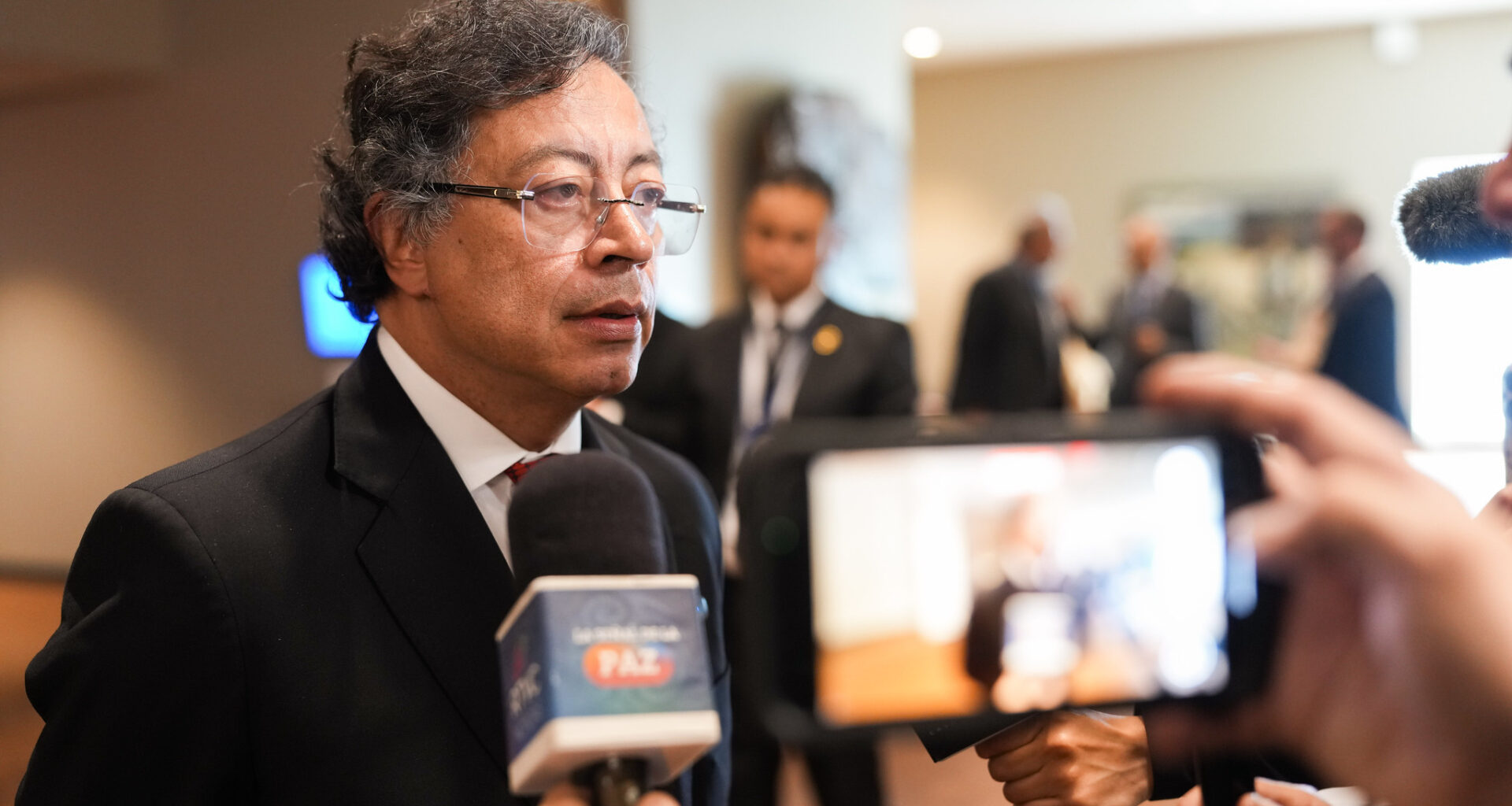
US revokes visas for President Petro and top Colombian officials, fueling a diplomatic crisis and deepening tensions between both countries. Credit: Hugo Sierra / Presidency of Colombia
The United States’ decision to revoke Colombian President Gustavo Petro’s visa has spiraled into a diplomatic crisis, sparking both formal cancellations and symbolic renunciations of U.S. visas by senior Colombian officials. The issue has quickly become a central point of friction in the bilateral relationship, raising questions about sovereignty, diplomacy, and the use of visas as a political weapon.
US revokes visas of top Colombian officials
The controversy erupted after Petro attended a pro-Palestinian demonstration in New York while the United Nations General Assembly was underway. During that event, he urged American soldiers to disobey orders and denounced the presence of Israeli Prime Minister Benjamin Netanyahu at the U.N. The State Department responded swiftly, announcing on Sept. 26 that it was revoking Petro’s visa because of what it described as incitement to violence and reckless rhetoric.
Washington’s action triggered immediate political shockwaves in Bogota. For Colombia, the issue was no longer just about Petro’s personal travel rights but about the broader question of how U.S. authorities might target his government. Admission into U.S. territory quickly became a diplomatic battleground. Within days, at least a dozen Colombian officials either saw their visas canceled or announced they would stop using them in solidarity with their president.
Among the most prominent was Angie Rodriguez, director of the Administrative Department of the Presidency (Dapre), who confirmed she received an email from the U.S. Embassy notifying her that her visa had been revoked without specific explanation. Energy Minister Edwin Palma later revealed that both his diplomatic and tourist visas had been invalidated, responding on social media with the provocative comment: “Gaza is worth a visa.” Equality Minister Juan Carlos Florian, a controversial figure who had recently returned to his post, also announced that his visa had been canceled. He used the moment to celebrate Petro’s U.N. speech, describing it as “historic and triumphant,” and mocking Washington’s decision as inconsequential to his pride.
A wave of renunciations as political protest
Not all cases involved direct cancellations. Several high-ranking officials decided to return or publicly renounce their U.S. visas as an act of solidarity and defiance. Colombia’s Foreign Minister Rosa Villavicencio was the first to do so, declaring her resignation from the privilege “an act of dignity in the face of the unacceptable decision to revoke the visa of Colombia’s president.” Her statement framed the move as a defense of sovereignty, insisting that Colombia would not “kneel” to external pressure.
Finance Minister German Avila echoed that sentiment, stating that he too would stop using his U.S. visa. In his words, working for the Colombian people “does not require a visa.” The gesture highlighted how Petro’s inner circle sought to transform the U.S. decision into a rallying point rather than a setback.
Other officials soon followed. Cielo Rusinque, the superintendent of Industry and Commerce, took her renunciation to social media, framing it as both a moral and political stance. She clashed publicly with a U.S. State Department official who had questioned the idea of “renouncing” a visa, responding that it was a matter of dignity and coherence with her worldview. In her words, “it is simple: resigning from a piece of paper that each day means less.”
Augusto Ocampo, the legal secretary of the presidency, added his voice by stressing that Colombia’s sovereignty could not be conditioned or subordinated by foreign powers. For him, the wave of cancellations and renunciations represented more than isolated acts, they were a symbolic reaffirmation of Colombia’s independence in the face of outside pressure.
Diplomatic consequences turn into a geopolitical dispute
The cascade of canceled and renounced visas has reshaped the diplomatic narrative between the two nations. What might once have been viewed as a bureaucratic sanction now functions as a flashpoint in a broader geopolitical dispute. U.S. officials framed their actions as a necessary response to inflammatory rhetoric from Colombia’s president, while Petro’s allies have turned it into evidence of Washington’s heavy-handedness.
The implications are profound. In practical terms, losing access to U.S. visas complicates travel for Colombian ministers and senior officials, limiting their ability to participate in bilateral talks, multilateral summits, or personal visits. Symbolically, the move signals a deterioration of trust between Bogota and Washington at a moment when cooperation is crucial on issues such as drug trafficking, migration, and trade.
For Petro’s government, however, the crisis presents an opportunity to consolidate a narrative of sovereignty and resistance. By portraying visa revocations as proof of U.S. overreach, Colombian leaders can rally domestic support and align themselves with broader anti-imperialist currents in Latin America. This strategy may resonate with certain sectors of the electorate, especially as Petro positions himself as a global voice on issues such as Palestine and climate justice.
At the same time, analysts warn that weaponizing visa policy carries risks for Washington as well. If the practice becomes a normalized tool in diplomatic disputes, it could provoke retaliatory measures or embolden governments that already maintain tense relations with the United States. Other Latin American countries are likely watching closely to see whether Colombia suffers significant consequences or whether the standoff strengthens Petro’s political posture.
The visa dispute could reshape Colombia-US relations
As of now, the officials confirmed to have lost or renounced their U.S. visas include Petro himself, Foreign Minister Rosa Villavicencio, Finance Minister German Avila, Equality Minister Juan Carlos Florian, Energy Minister Edwin Palma, Dapre director Angie Rodriguez, Superintendent Cielo Rusinque, and Legal Secretary Augusto Ocampo, among others. The list continues to evolve, underscoring the scale of the rupture.
What began as a sharp rebuke of Petro’s speech has expanded into a test of the resilience of Colombia-U.S. relations. The coming months will determine whether both governments seek off-ramps to de-escalate or whether the crisis becomes a new normal in their interactions. Beyond visas, the episode highlights the fragile balance of power in diplomacy: how a single policy tool can spiral into a defining issue in hemispheric politics.
For now, one thing is clear, the question of visas has become more than an administrative matter. It is now a symbol of sovereignty, loyalty, and political identity, with consequences that reach far beyond the stamping of a passport.

